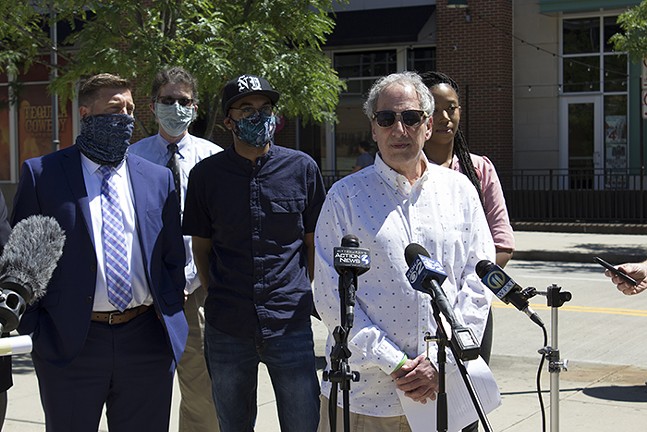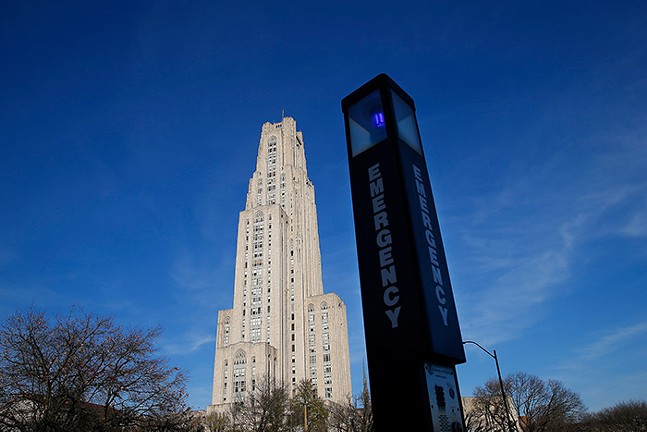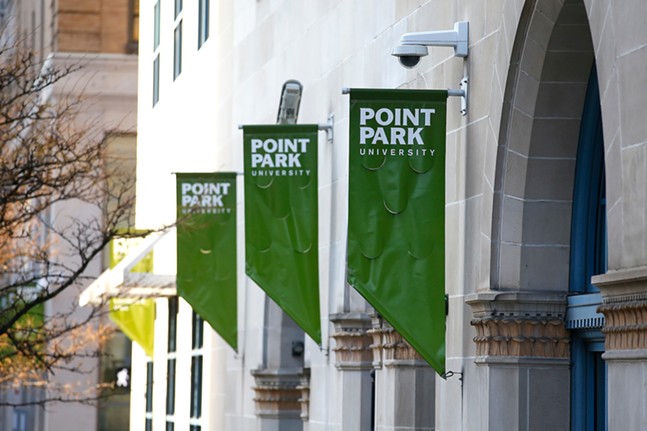The Newspaper Guild of Pittsburgh has rebuked those implications, saying in a statement “there is no cover-up here,” and claiming the union took action the day that credible accusations had been presented. Post-Gazette management has also defended the level of punishment it levied against Fuoco, and said it was only aware of one complaint, not the several detailed in the New York Times report.
But allegations against Fuoco don’t just span his time at Pittsburgh’s largest paper or his time as union president. Fuoco also worked as an adjunct professor at two Pittsburgh universities, and former students have also lodged allegations against him of inappropriate behavior, drug use, and emotional manipulation of college-aged women, who were often 30 to 40 years younger than Fuoco.
Pittsburgh City Paper spoke to five sources who say they lodged complaints against Fuoco while he was an adjunct professor at Point Park University and the University of Pittsburgh, as well as times before he was an adjunct at the schools, when he was invited to speak to journalism students. Three women have detailed specific allegations against him that span at least 10 years, and include accusations that Fuoco used his status as a professor and award-winning journalist to pressure them into inappropriate situations.
Diana Kelly first met Fuoco when she was a student at Pitt in 2002. After the semester, Fuoco allegedly invited Kelly out for a drink to discuss her future as a journalist. But while at a South Side bar, Kelly, who was suffering from depression at the time, says it became clear Fuoco was interested in more than journalism. Fuoco, 30 years her senior, slid closer to her throughout the night, Kelly says, and then kissed her. That began an on-and-off again relationship that Kelly says was riddled with manipulation from Fuoco.
“I was 22 years old, I was a grown adult, I could have made better decisions,” says Kelly. “But I fault him for exploiting his position as a professor and the emotional case I was in. I think he was specifically using his position as an adjunct professor to meet girls.”
Kelly, two other women, and others who have accused Fuoco say the officials at the universities were informed about complaints against Fuoco. Everyone understands that college students are adults, but say they wish university officials, advisors, and professors would have stepped in at times to counsel them about getting into a relationship with Fuoco. And many of them wonder if the university officials and others informed about allegations could have done more to prevent or limit Fuoco’s contact between students and college-aged women.
Complaints against Fuoco likely led to his removal from the University of Pittsburgh in the mid-2000s, but he was later hired at Point Park University in the 2010s. About a year after his hiring, complaints against him also led Point Park to not bring him back as an adjunct. After that, Fuoco was partnered with one of his former Point Park students when she became an intern at the Post-Gazette in 2012. That intern recently revealed accusations of Fuoco being inappropriate with her at the end of her internship.
According to the New York Times, Post-Gazette veterans called Fuoco’s behavior an “open secret,” dating back at least to the 1990s. Multiple women told CP that Fuoco juggled several sexual relationships with young women at the same time, all while maintaining a marriage to his wife. In the Times, one woman called Fuoco “Pittsburgh’s Harvey Weinstein," comparing the reporter to the Hollywood producer who used his position of power to manipulate women into believing they could get further ahead in their careers.
But it looks as if the open secret was rarely communicated among university officials, not just between separate universities but within their own walls, potentially letting students enter into interactions with a journalist who has been accused several times of preying on impressionable young women.
This September, Fuoco, 69, resigned from his role as guild president and reporter at the Post-Gazette after Pittsburgh-based labor news site Payday Report published anonymous accusations of sexual misconduct against him.
Fuoco did not respond to multiple requests for comment for this story. In the Times report, which includes mention of some of Kelly’s allegations, Fuoco said the accusations of sexual misconduct against him are “false.”
Kelly detailed her story to CP, and provided hundreds of emails between her and Fuoco that confirm there was a relationship between the two. She was a student in Fuoco’s journalism course beginning in 2002. At the time, Fuoco was a star in the Pittsburgh journalism world and received praise and accolades for his 2000 article “The Confessor,” a feature about a Pittsburgh homicide detective.
Kelly, who was about 30 years Fuoco’s junior at the time, says, as a professor, he highlighted that experience, and while some students thought it was a bit much, she enjoyed it.
“All we did was just read his newspaper articles and talk about how wonderful it was,” says Kelly, who is now a high school teacher. “I sort of bought into it. And he told me that I was super wonderful and talented. He said I had this great future in journalism.”
When the semester ended, Kelly says she went out to drinks with Fuoco at the Lava Lounge, a former bar in the South Side. There, she says, they sat in a booth and didn’t really talk about her journalism career like Kelly assumed they would, and Fuoco eventually kissed her after sliding closer to her.
Kelly says she was suffering from severe depression at the time, and that was a big reason she transferred to Pitt from Penn State University, to be closer to family and her health network. She says Fuoco was aware of her depression and that during their relationship, he even bragged about his ability to detect “drug problems, daddy issues, or mental health issues” in women."I think he was specifically using his position as an adjunct professor to meet girls.”
tweet this
“He is proud of this because he knows he can go after those with mental issues, or drug issues,” says Kelly. “I have a chronic pain disorder. This is lifelong.”
Brian Washington was Kelly’s boyfriend, who she left to start her relationship with Fuoco. Washington, now a small business owner in Charlottesville, Va., told CP that he contacted the Pitt English Department in Spring of 2003 to issue a complaint about Fuoco. He says he informed the department about what Fuoco was “doing to girls and how the girls thought he loved them” and alleged to the university that Fuoco was using drugs like cocaine and providing drugs to girls and students.
“There was a lot of emotional manipulation,” Washington recalls telling Pitt officials.
Washington says he also told Pitt about Fuoco impregnating another college student, which was information relayed to him from Kelly. Court records in a child support case show that Fuoco did impregnate a 22 year-old-student at Point Park around the same time that Kelly was in a relationship with Fuoco.
In a statement sent to CP, University of Pittsburgh officials said the public allegations against Fuoco’s actions are “deeply troubling, and the harmful behavior described in news reports is absolutely unacceptable.”
Pitt says that Fuoco hasn’t taught as an adjunct at the university in over a decade, and that records don’t show any official complaint raised by Pitt students, but the school is aware that “concerns were raised about Fuoco from two people not affiliated with the University.” The school’s records indicated that Fuoco was informed of the concerns. There was no record of formal investigation or sanction, according to the university.
It’s unclear when or if Fuoco was ever officially let go by Pitt.
In the time since Fuoco was at the university, Pitt says it has established a new inclusion office in 2015, clarified its policy on inappropriate relationships, and defined a more robust process for reporting and addressing misconduct, including anonymous reporting, mandatory training for students on how to report sexual misconduct allegations, and a peer-to-peer program for engaging students about consent and healthy relationships.
“While this work is underway, it is far from complete, and we continue to seek new ways to prevent sexual misconduct, provide support to victims, and investigate and address wrongdoing,” reads a statement from Pitt.
Pitt’s former English Department chair David Bartholomae says he was contacted about Fuoco, but that it wasn’t Washington who contacted him. Bartholomae says he then met with Fuoco and “made clear the university’s position on sexual harassment and intimate relations with students.” He says he reported Fuoco to the Dean, as well as “alerted those involved with the journalism courses to let me know immediately if they received complaints or concerns from students.”
Bartholomae says he never received a complaint from a student during his tenure.
“I had never received a complaint from a student, either before or after that meeting,” said Batholomae.
Kelly says she understands the predicament that universities are in when receiving reports about relationships between students and professors, since students are almost always adults. She also acknowledges those waters become murkier when college-age people are no longer direct students of professors and lecturers.
Pitt’s current policy prohibits intimate relationships between a faculty member and a student whose academic work, teaching, or research is being supervised or evaluated by the faculty member. If a relationship does occur, the faculty member must remove themselves from all supervisory, evaluative, and/or formal advisory roles with respect to the student. This policy was adopted in 2017, and it’s unclear what the university policy was in the mid 2000s.
But Kelly does believe Pitt could have at least initiated an investigation upon receiving a complaint about an inappropriate relationship. Kelly says most of the correspondence she had with Fuoco was through her Pitt email.
While she felt she was in love with Fuoco at the time, she still doesn't really know if she would have refused to speak to the university if she had been contacted. As she has gotten older, Kelly says she has realized that Fuoco was emotionally manipulating her. Kelly mentions a time when she says Fuoco wanted to watch her have sexual relations with his brother.
“If the university gets a complaint and a victim’s name is mentioned, like in my case, then maybe I would have talked, and maybe they could have saved me,” says Kelly. “But it obviously didn't happen.”
Kelly says she isn’t looking to press charges, but does want to raise awareness around these issues of sexual misconduct and inappropriate relationships between college students and professors. She says that perhaps a more stringent background check program could become the standard for college employment, as a way to stop perpetrators from preying on college students.
Another woman who spoke to CP first met Fuoco when she was a student at Point Park University. Fuoco was 30 years older than her at the time.
“I didn’t know him until he was invited to come and talk to students in fall of 2001,” says the former student, who requested anonymity for this story. “Our journalism professors were saying this was the person to model after.”
Like Kelly, this Point Park student says she was also told by Fuoco that she was a talented young journalist and asked to review her clips over drinks. She declined initially, but he emailed and called her several times and praised her more about her journalism. Eventually, she started a relationship with Fuoco, and she later discovered that she was regularly one of several young women having regular sexual encounters with Fuoco.
She says that Fuoco started to manipulate her, and used his position of power over her.
“Fuoco didn’t say if I did what he wanted, I would get a job,” says the former student. “But he said if I didn’t do certain things he wanted me to do or if I told the truth about him, I would never work in this town. He also said nobody would believe me.”
Another former Point Park student and former local news reporter who graduated in 2002 and asked to remain anonymous says they were never involved with Fuoco. They say Fuoco was a regular at the River City Inn, a bar popular with journalists at the time, and he would often buy drinks for female students. The former student says many Point Park journalism professors also frequented the bar, and had ample opportunity to observe Fuoco.
“If you didn’t know, you should have known, and if you didn’t know, it was pretty fucking obvious,” says the former student. “Anytime there was anyone young there, even if someone I didn’t know, he was buying them drinks. Young women.”
The former student recalls that, one night at an end of the semester party for journalism students, Fuoco was drunk and he hit on at least four different girls. The former student also says that Fuoco regularly used cocaine, which they say he once offered to them, and would sometimes pressure people to smoke majriuana in his car with him.
A 2010 profile of Fuoco in the Point Park Globe student newspaper reports that Fuoco admits growing close to students, “many of whom came from dysfunctional families and did not have positive male role models.”
“On the weekends I would take them out on my own dime,” Fuoco said in 2010 of college students, “because no one else was going to do that.”
The former student who had a relationship with Fuoco says he claimed he was estranged from his wife, but she says his wife still worked at the Post-Gazette with Fuoco. The Globe profile of Fuoco quoted his wife in the story.
Another former student, who worked at Point Park’s student newspaper, started to work on a story on Fuoco, after hearing accounts of Fuoco’s behavior towards students.
They first reached out to a Point Park professor, who they declined to name, who told them to contact Fuoco directly. When they called Fuoco, they claim he told them that they shouldn’t write the story, telling the student they “would never work in this town” if they did.
The former student who had a relationship with Fuoco says she contacted Point Park journalism professor Bill Moushey in 2005 and informed Moushey about Fuoco, since she knew he was starting another relationship with a Point Park student. She says Moushey, who published a book about Jerry Sandusky and the cover-up of sexual assault at Penn State, was close friends with Fuoco.
“Bill Moushey didn’t ever cross a line, but he basically protected his friend who was the biggest creep in Pittsburgh,” she says.
Moushey didn’t respond to a request for comment for this story. Helen Fallon, the chair of Point Park’s department of journalism and mass communication from 1998 to 2008, says that she was never informed about Fuoco’s behavior and that no Point Park student ever reached out to her about Fuoco.
Despite the alleged complaints by the former student in 2005, Fuoco was still hired as an adjunct professor at Point Park in 2010.
“I was counting on the adults somewhere along the line, to do something, to say something,” says the former student. “That 30 year age difference is enough. This man is serial, a serial womanizer.”
The former student again lodged a complaint against Fuoco in December of 2011, when she learned he was teaching at the university. She says that Heather Starr Fielder, a professor at Point Park, responded promptly to the complaint.
Starr Fielder didn’t respond to a request for comment, but Point Park spokesperson Lou Corsaro said that “Point Park University has zero tolerance for sexual harassment, ethnic intimidation, and gender discrimination” and that when the university was made aware of concerns that, while not a formal complaint, it “led to a decision to not reappoint him to teach at Point Park University.” Fuoco taught two classes at Point Park, one in 2010, and one in 2011.
Corsaro says “the policy of the University's Title IX office is that a victim can file a claim at any time, regardless of how long ago the incident occurred — there is no statute of limitations.”
Even though Fuoco only taught at Point Park for a short time, a former student named Emily Petsko believes his time there was part of what led to an alleged inappropriate encounter she had with Fuoco in 2012.“I was counting on the adults somewhere along the line, to do something, to say something."
tweet this
Petsko was a student in Fuoco’s class at Point Park in 2010, where she says he often praised her. In 2012, while she was still a senior at Point Park, Petsko had an internship with the Post-Gazette, which is confirmed from a 2012 story on Point Park’s website. While interning, Petsko was paired with Fuoco as her mentor. She recently revealed on Facebook that, at the end of her internship, Fuoco came on to her after she went out with him for drinks. Fuoco was nearly 40 years older than Petsko at the time.
“Was it illegal? Perhaps not. Was it wildly inappropriate, uncomfortable, and emotionally damaging? Yes,” wrote Petsko in the post.
Petsko says that Fuoco kept buying her drinks throughout the night despite her refusals, and then he pressured her into smoking marijuana in his car with him. She says she refused that, too.
I have nothing to lose or gain from this, but Mike Fuoco also came on to me when I was a 21-year-old senior in college,...
Posted by Emily Petsko on Monday, December 7, 2020
“I remember him saying, ‘You look like the most beautiful woman in the world right now,’ and ‘You must find me attractive, don't you?’ followed by an insinuated offer to go somewhere else,” wrote Petsko.
Petsko says she rejected Fuoco and says she tried to diffuse the situation, telling him, "I'm 40 years younger than you and this is starting to sound like sexual harassment." According to Petsko, he then became angry and claimed that he's received unwarranted accusations of sexual misconduct in the past.
“It was a shock, and a complete betrayer of trust,” says Petsko in an interview with CP. “I really looked up to him, he was a good mentor, and gave good advice. In hindsight, it was a clear abuse of that power.”
She says that Fuoco was impaired when he was driving her from bar to bar, and she felt that him driving her probably limited her ability to leave each situation.
Petsko posted her story to Facebook last week, and she says it was the first time she publicly revealed what happened to her. She says she hasn’t filed a formal complaint about Fuoco.
Looking back, Petsko says she wishes she had known about Fuoco, that someone would have warned her, and that she was not assigned as his intern protege. She says she believes she was assigned to Fuoco because she was his former student.
When inquired about Fuoco’s behavior while at the Post-Gazette, the paper didn’t respond to specifics about how Petsko was paired with Fuoco or answer questions about if the paper received any communication from Point Park about complaints the university had received pertaining to students.
The Post-Gazette said, in a statement to CP, that when allegations came to light this year about Fuoco, the paper had outside counsel investigate the matter. That investigation found “only one complaint had been filed concerning Mr. Fuoco’s behavior towards women which was in 2011” and that the paper “appropriately addressed that complaint by suspending Mr. Fuoco for five days without pay.”
Ed Blazina is the interim president of the Newspaper Guild of Pittsburgh, the union representing Post-Gazette journalists. He took over as president after Fuoco resigned in September.
He says that Fuoco’s alleged behavior against Petsko is “disgusting” and says that the union wasn’t aware of any first-hand sexual misconduct allegations against Fuoco until September of this year. The union recently said in a statement that an investigation started this year turned up a mention of Fuoco in 2000 that a third-party described at the time as sexual harassment but provided no details.
Blazina said the guild was not made aware of any complaints against Fuoco from Point Park or from the University of Pittsburgh. He says that P-G internships are situations “where we want to foster younger people in the industry," and that Fuoco’s alleged behavior towards Petsko “is not a part of having an inclusive workplace.”
He says the Post-Gazette has an intern coordinator on staff, but he is unclear who makes the assignments. He doesn’t believe the guild had any say on which interns are partnered with which staffers.
In the end, several informal complaints occurring at Pitt, Point Park, and the Post-Gazette over the decades appeared to have little effect on sequestering Fuoco away from students and college-aged women.
According to a post on Point Park’s website, Fuoco was invited back to work with the university in 2019, not as an adjunct, but for a journalism panel for high school students. As part of the panel, he apparently took a group of high school students, including several teenage girls and a high school teacher, on a tour of the Post-Gazette offices.
At time of print, Point Park is still advertising this tour with a photo of Fuoco and the students on its website.
Editor's Note: Story has been updated to clarify David Bartholomae's statements. He says he never received a complaint about Fuoco from a student.






